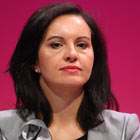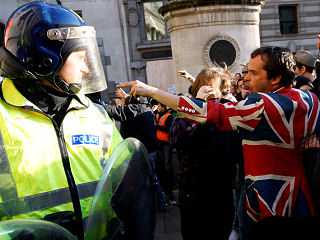Michael Evans, Defence Editor, and Russell Jenkins
Scotland Yard’s counter-terrorism chief has resigned today after accidentally revealing a briefing document detailing a counterterrorist operation against al-Qaeda suspects in the UK.
Boris Johnson, the Mayor of London, said he had accepted the resignation of Bob Quick, with “great reluctance and sadness”.He will be replaced by Assistant Commissioner John Yates.
A huge MI5 and police counterterrorist operation against the suspects had to be brought forward at short notice last night because of the blunder.
Twelve people were arrested, ten of them born in Pakistan, at eight separate addresses after a long covert surveillance operation involving MI5 and police from the North West Counter-Terrorism Unit was compromised.
Senior sources believe that there were plans to attack the Birdcage nightclub in Manchester city centre or the Trafford Centre shopping complex. The nightclub, which hosts cabaret and dancing showgirls, attracts thousands of people each week.
Detectives believe that the venue, near The Printworks entertainment complex, was being targeted as a “symbol of Western decadence”. The Trafford Centre in Manchester attracts 140,000 shoppers each weekend.
The operation was nearly blown when Mr Quick walked up Downing Street holding a document marked “secret” with highly sensitive operational details visible to photographers.
The document, carried under his arm, revealed how many terrorist suspects were to be arrested, in which cities across the North West.
It revealed that armed members of the Greater Manchester Police would force entry into a number of homes. The operation’s secret code headed the list of action that was to take place.
The assistant commissioner had been scheduled to see the Prime Minister and Jacqui Smith, the Home Secretary, about police reform in his capacity as a member of the Association of Chief Police Officers, but the document indicated that he was planning to outline to Gordon Brown that police raids were imminent.
As soon as the photograph was circulated, MI5 and Scotland Yard took immediate steps to stop its publication, fearing that even a reference to Mr Quick’s arrival in Downing Street might tip off the suspects.
A rare D-notice — guidance issued from the Ministry of Defence to safeguard issues of national security — was slapped on media organisations.
However, the photograph of the document had already been distributed abroad, where the D-notice system carries no weight. Getty Images, which took the photograph, agreed to take it off its website, but foreign media organisations that have contracts with Getty had already received the picture, along with every national newspaper in Britain. A Californian magazine also had the picture.
Frantic discussions took place between the police and MI5 and a decision was taken to bring forward the raids from 2am to 5pm.
As newspapers mulled over the contents of the D-notice, police officers from the terrorism unit, supported by officers from Greater Manchester, Merseyside and Lancashire, carried out a series of moves. Instead of a planned operation in the early hours, the armed police had to swoop on the addresses while it was still light.
A senior officer said: “This was a massive compromise of the whole operation.”
Last night Mr Quick apologised to Sir Paul Stephenson, the Metropolitan Police Commissioner, for the security blunder that nearly put paid to months of surveillance work.
A Scotland Yard spokesman said: “Assistant Commissioner Quick accepts he made a mistake on leaving a sensitive document on open view and deeply regrets it.”
The arrests appear to have foiled a major terrorist plot. Senior detectives said that there was an “imminent and credible” threat of an atrocity by an al-Qaeda-linked group.
One officer said: “These are the most significant arrests for some time. There was information which led us to believe that these men were planning something major. It was not clear when or where they would strike, but they were collecting material for a large explosion. We are talking about something big.”
Two men were arrested at a house on Galsworthy Avenue in Cheetham Hill, Manchester, two at a premises on Cheetham Hill Road, one on the M602, three at Cedar Grove in Merseyside, one near Liverpool John Moores University, one on Earle Road in the Wavertree area of Liverpool, and two at a Homebase store in Clitheroe. The suspects included a teenager and a man aged 41.
Mesu Raza, an unemployed man from Pakistan who lives in a flat above Cyber Net Café, said: “I saw police arrest two people. There were a large number of police vans.”
Witnesses to the arrests on Galsworthy Avenue said that the two men tried to make a run for it.
Bushra Majid, 33, a mother of four and Urdu-speaker, said that she recognised the men as speaking Pashtun, a dialect from Afghanistan.
She said: “Six or seven men used to live there and every day they went to the al-Falah mosque [an Islamic centre on Haywood Street].” She said that the men were aged between 25 and 50. She said there were lots of people coming and going all the time.
At about 5pm she opened the door after hearing noises and saw police dragging a man without shoes along the pavement. She said the men arrested were “darker and had longer beards” than the predominantly Pakistani population in the area.
A woman living near the Cheetham Hill house where three men were taken away told the BBC: “They were just nice neighbours, not noisy, never did anything to disturb anybody.”
Police have also sealed off a terrace of properties in Earle Road in the Wavertree area of Liverpool and witnesses said a man was arrested at a flat above a shop just before 5pm.
Witnesses at Liverpool John Moores University said that two Asian men in their mid to late twenties were held by armed police outside the main library. Greater Manchester Police said that just one man was arrested there.
Craig Ahmed, 24, a business student from Maghull, Merseyside, said: “There was all shouting and commotion outside so I went to the window and saw about eight police officers. One of them was armed and was pointing his gun at two men who were ordered to lie face down on the ground.
“For about half an hour they held the men on the floor. The police were shouting things at them but I couldn’t hear what was being said. They looked like students. One was wearing tracksuit bottoms and a hooded top and the other had a Puffa-style jacket on.
“The police searched a satchel belonging to one of the men and a carrier bag belonging to the other one. The two men were then searched as they were on the ground and cuffed and taken away.”
Police also removed evidence from a Homebase DIY store in Clitheroe.
It is the second time in recent months that Mr Quick has had to apologise. He was the officer who ordered the arrest of Damian Green, the Shadow Immigration Minister, in November, after an investigation into leaks of Home Office information by a civil servant to the Conservative Party. He later accused “the Tory machinery” of undermining his investigation. He had to apologise after the Tories denied his accusation of dirty tricks.
Cheetham Hill has been the centre of terror investigations before. In November 2007, Abdul Rahman, 25, from Pakistan, became the first person in Britain to be convicted of disseminating terrorist information. He ran a cell largely based at a council house in Cheetham Hill. He recruited young Muslim men for a “holy war” against coalition forces in Afghanistan.
Source: www.timesonline.co.uk, April 9, 2009







